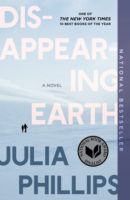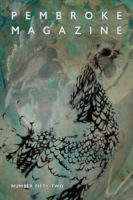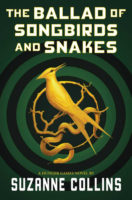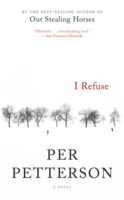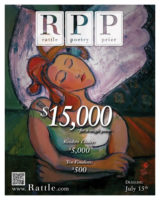Deadline: Halloween 2020 at Midnight
We with Raleigh Review believe that great literature inspires empathy by allowing us to see through the eyes of our neighbors, whether across the street or across the globe. We are currently open to general submissions for poetry and flash fiction through Halloween 2020 at Midnight. There is a small convenience fee to submit to our general submission categories as this helps to defray the costs associated with operating via the Submittable platform, a necessary resource for us as our staff is located across the country and at times the world. We encourage you to check out our free full-issue online archive to find out more about us: www.raleighreview.org.
NewPages Blog
At the NewPages Blog readers and writers can catch up with their favorite literary and alternative magazines, independent and university presses, creative writing programs, and writing and literary events. Find new books, new issue announcements, contest winners, and so much more!
Contest :: Crazyhorse’s Crazyshorts! Contest Opens July 1
Deadline: July 31, 2020
July 1 is tomorrow which means Crazyhorse‘s annual Crazyshorts! competition will be officially open to submissions. From July 1st to July 31st, Crazyhorse will accept entries for our annual short-short fiction contest. Submit 3 short-shorts of up to 500 words each through our website: crazyhorse.cofc.edu. First place wins $1,000 and publication; 3 runners-up will be announced. All entries will be considered for publication; the $15 entry fee includes a one-year subscription to Crazyhorse. For more information, visit: crazyhorse.cofc.edu/crazyshorts.
Spread the word!
Call :: Main Street Rag Seeks Poetry & Prose on Mental Health Recovery
Don’t forget that Main Street Rag seeks poetry and prose (fiction/nonfiction) for an anthology with a mental health recovery theme; uplifting stories of overcoming mental health challenges and trauma from writers who have experienced a mental illness or love someone who has. Length: up to 6,000 words (prose) or 5 poems. Reading Period: May1-August 1. Simultaneous submissions and previously published considered, however, authors must own the rights (no third-party permissions). Questions may be directed to editor Erika Nichols-Frazer at [email protected]. Submissions should be sent to: mentalhealth.submittable.com/submit.
Spread the word!
Get Lit: Writing Contests & Calls for Submissions Delivered Weekly!
 Writing contests and calls for submissions you want to know about delivered to your inbox every week. Plus, book and magazine review updates, new issues and title announcements, creative writing program deadlines and announcements, upcoming writing conferences and events, and more. Subscribe to the NewPages Newsletter here: npofficespace.com/newpages-newsletter/. You will also be signed up to receive our monthly eLitPak newsletter.
Writing contests and calls for submissions you want to know about delivered to your inbox every week. Plus, book and magazine review updates, new issues and title announcements, creative writing program deadlines and announcements, upcoming writing conferences and events, and more. Subscribe to the NewPages Newsletter here: npofficespace.com/newpages-newsletter/. You will also be signed up to receive our monthly eLitPak newsletter.
Spread the word!
Call :: Spread Art & Philanthropy with COVID LIT
COVID LIT is a monthly online lit mag that mobilizes writers to combat the world’s ills by not only providing a platform for urgent poetry and prose, but by directing money to regional, national, and international nonprofits. Instead of paying a submission fee, writers must donate at least $3 to a nonprofit of their choice. In our first two months, our writers have donated over $4000 to various causes related to COVID-19, racial injustice, homelessness, mental health, and others. Visit www.covidlit.org and send us your best work today!
Spread the word!
Sleet Magazine – Spring Summer 2020
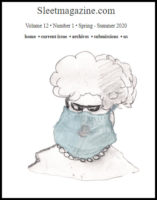
Sleet Magazine‘s slim Summer Edition has arrived! We promise you will not be disappointed; the pieces have heart and guts. Proud to showcase work by poets B. Baumgart, L. Castle, M. Dillon, J. Palen, O. Umukoro; Fiction by E. Ferrell, P. Sterling, SF Wright, K. Skiles Law; and CNF by A. Schur and W. Thornton.
Spread the word!
Call :: The CHILLFILTR Review Publishes New Work Weekly
Submissions accepted year-round.
Don’t forget The CHILLFILTR Review is striving to bring the best new art to a worldwide audience by leveraging best-in-class technology to create a seamless and immersive web experience. They welcome submissions from all walks of life, and all perspectives and are committed to inclusivity and kindly welcome work from marginalized voices. All featured works will receive an honorarium of $20 per 1000 words and will be published online at The CHILLFILTR Review as well as on their Apple News Channel. Readers can vote for their favorites, and year-end “Best Of” winners will receive an additional $100 cash prize.
Spread the word!
Missouri Review – Spring 2020
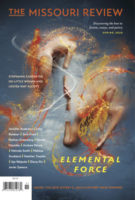
The “Elemental Force” issue of Missouri Review is out. Inside: The 2019 Jeffrey E. Smith Editors’ Prize winners, and Stephanie Carpenter on Little Women and Louisa May Alcott. Featuring John Balaban, Nathan Greenberg, Daniel Hornsby, Melissa Studdard, Diana Xin, Javier Zamora, and many more.
Spread the word!
Contest :: The Hunger Press Seeks Chapbooks
Deadline: September 1, 2020
Don’t forget that The Hunger Journal has now expanded to include The Hunger Press, starting with their Tiny Fork Chapbook Series. They believe art and literature is eternally important, and want to use this opportunity to welcome new writers and readers into The Hunger community by producing well-designed, dynamic, hand-bound chapbooks. They will be accepting submissions from June 1–September 1. They welcome poetry, prose, and hybrid manuscripts of 15–40 pages. For more details on the Tiny Fork Chapbook Series and submission process, please go to www.thehungerjournal.com/tiny-fork-chapbooks.
Spread the word!
The Iowa Review – Spring 2020
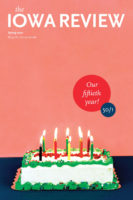
The latest issue of The Iowa Review is out. In this issue: birthday cake, auctioneering school, the 2018 Hawaii false missile alert, a male masseuse in Kanagawa Prefecture, a love performance, the winner of the 2019 David Hamilton Prize for Iowa Review Alumni, and tributes to Connie Brothers.
Spread the word!
Tolsun Books Seeks Volunteers
Tolsun Books is looking to expand our small, collaborative, remote team of volunteers. If you are passionate about energetic works of literature, and have experience in aspects of literary publishing, especially copy-editing and/or proofreading, please send us an email at [email protected].
Spread the word!
The Georgia Review – Summer 2020
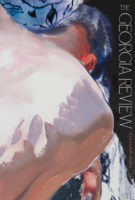
The Georgia Review‘s latest issue features new writing from Garrett Hongo, Aimee Nezhukumatathil, Laura van den Berg, A. E. Stallings, and many other exciting voices! Original translations of poetic works by Hisham Bustani and Shuzo Takiguchi. Illustrated features on the theme “Shelter in Place,” by Lindsey Bailey, Kaytea Petro, and Bishakh Som. Cover art and portfolio by Doron Langberg. This issue is not to be missed—read selected online features today!
Spread the word!
Call :: Words & Whispers Seeks Black Lives Matter Submissions
Deadline: Rolling
We want to publish your voices and experiences. Let your perspectives be heard. Send us your poetry, prose, and personal essays. We accept written work from writers of all ages. For more information please visit www.wordsandwhispers.org.
Spread the word!
Mayday Makeover
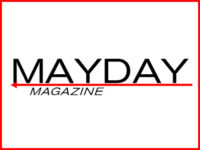 Mayday Magazine‘s website has a had a makeover! The new set-up has different genres in the header so readers can choose their favorites there, and the homepage displays new, featured work. The newly designed site looks modern and is easy to navigate. Who doesn’t like to experience some change once in awhile? Check it out for yourself and sign up for the magazines newsletter while you’re there for even more updates from Mayday.
Mayday Magazine‘s website has a had a makeover! The new set-up has different genres in the header so readers can choose their favorites there, and the homepage displays new, featured work. The newly designed site looks modern and is easy to navigate. Who doesn’t like to experience some change once in awhile? Check it out for yourself and sign up for the magazines newsletter while you’re there for even more updates from Mayday.
Spread the word!
Dip Your Fingers in a Faraway World
Julia Phillips’s Disappearing Earth opens on the shores of a sea lapping at the edges of the Siberian Peninsula. Two young sisters are playing on the beach. It’s a simple enough setting. The older one is trying to get the younger one to come home. You don’t yet know why, but you’re starting to feel unsettled and you can almost feel the oncoming danger. By the end of the chapter, the girls have disappeared.
The chapters that follow are not an investigation into the disappearance. Instead they are stories of various inhabitants located in and around the Kamchatka Peninsula. The disappearance of the girls hangs over each of them, but the stories are about their own lives. A new mother struggling to come to terms with staying at home and giving up her career. A mother whose child similarly disappeared three years ago. And that’s when the patterns start emerging. The complexity of relationships, the underlying beliefs and mistrust towards certain groups of people. Natives are treated in a slightly different way. There is a distrust towards the so-called new people who have migrated to the region. There are superstitions and practices. And you realize that ultimately people are the same, no matter where they are. We’re all dealing with the same issues.
The setting of Disappearing Earth makes you feel as though you’ve dipped your fingers into a faraway world. The descriptions of the volcanoes and open tundras and thermal springs and open fields add an allure to the overall story. You sometimes feel as though you really are at the end of the world. The ending is stunning, and Julia Phillips ties up at the loose ends in a way that makes you close the book with a satisfied hush.
Disappearing Earth by Julia Phillips. Penguin Random House, April 2020.
Reviewer bio: Karabi Mitra is an avid reader, based in Toronto. She also enjoys writing and has been published in various literary magazines such as Litro Magazine and Volney Road Review.
Spread the word!
2019 Carve Prose & Poetry Contest Winners
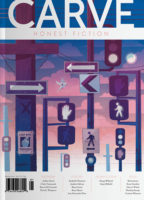 Carve annually hosts the Prose & Poetry Contest for submissions in fiction, nonfiction, and poetry. There is one winner in each genre category, each awarded a $1000 prize.
Carve annually hosts the Prose & Poetry Contest for submissions in fiction, nonfiction, and poetry. There is one winner in each genre category, each awarded a $1000 prize.
Readers can find the winners of the 2019 contest in the Spring 2020 issue.
Fiction
“A Simple Case” by Nancy Lundmerer
Nonfiction
“From the Book on Pit Firing Pottery” by Sarah Sousa
Poetry
“Cleft” by Jason M. Glover
The judges for this past year’s contest were Lydia Kiesling in fiction, Analicia Sotelo in nonfiction, and Benjamin Busch in poetry. Submissions for this year’s contest will reopen at the beginning of October.
Spread the word!
Call :: Blue Mountain Review Seeks Work with Homespun & International Appeal
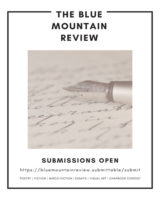 Submissions accepted year-round.
Submissions accepted year-round.
The Blue Mountain Review launched from Athens, Georgia in 2015 with the mantra, “We’re all south of somewhere.” As a journal of culture the BMR strives to represent life through its stories. Stories are vital to survival. Songs save the soul. Their goal is to preserve and promote lives told well through prose, poetry, music, and the visual arts. The editors read year-round with an eye out for work with homespun and international appeal. They’ve published work by and interviews with Jericho Brown, Kelli Russell Agodon, Robert Pinsky, Rising Appalachia, Nahko, Michel Stone, Genesis Greykid, Cassandra King, Melissa Studdard, and A.E. Stallings. www.southerncollectiveexperience.com/submission-guidelines/
Spread the word!
2019 Able Muse Write Prize Winners
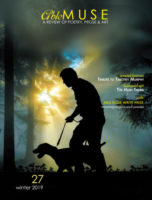 Able Muse‘s annual Write Prize awards $500 for the best submitted poem, $500 for the best submitted flash fiction, and publication in the print journal. The Winter 2019 issue of Able Muse features the winners of the 2019 contest.
Able Muse‘s annual Write Prize awards $500 for the best submitted poem, $500 for the best submitted flash fiction, and publication in the print journal. The Winter 2019 issue of Able Muse features the winners of the 2019 contest.
Poetry Winner
“Waiting for the Angel” by David MacRae Landon
Poetry Finalists
“Dear Sonnet” by Amy Bagan
“Paradox” by Beth Paulson
“Postcard, Vermont” by Miriam O’Neal
Fiction Winner
“To the Bottleneck Fiction” by Erin Russell
Stay tuned for the winners of the 2020 contest, which closed this past March.
Spread the word!
Maggie Smith Writes to America
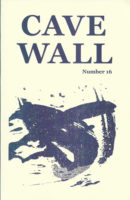
Magazine Review by Katy Haas
In Cave Wall Number 16, Maggie Smith writes a poem to America. “Tender Age” focuses on the reality of the country, which is decidedly “not what I learned / in grade school.” Instead, this America “caged / even the babies.”
She questions who our laws serve, questions where the country’s conscience lives, or where it’s been removed from. Reminiscing on the past, Smith writes of the street she grew up on and the church she attended, as well as the handbells played there. These memories are unburied again as she wonders whether there will be “neighborhoods / named for this undeclared war” like we’ve named ones “Lexington, / Bunker Hill, Valley Forge.” Finally, the piece ends on the images of the handbells again ins sobering stanza:
America, when we want to silence
the bells, we extinguish
their open mouths
on our chests.
This poem is unfortunately continuously timely and relevant with the continued practice of caging migrant children and following the recent news that another 1,500 have been “lost.” Smith’s poem encourages readers to join in as she speaks to America and against the horrific, harmful systems we’ve created.
Spread the word!
Natasha Reads ‘The Jane Austen Society’ by Natalie Jenner
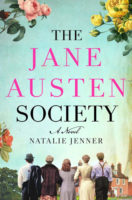 Guest Post by Natasha Djordjevic
Guest Post by Natasha Djordjevic
Natalie Jenner’s debut novel, The Jane Austen Society, is a delightful, insightful tribute to the author who brought us so many memorable characters. The story is set at the end of WWII in Chawton, where Jane Austen spent the last part of her life and where she wrote her final three novels. A group of unlikely people become friends and form a society that has a mutual love for Jane Austen. They want to use their love to save her home and make it a museum with items of the era she resided in.
We’re introduced to Adam Berwick, a farmer who is the character we meet first, upon meeting with a stranger looking for Austen, develops an affection of Austen’s works; Dr. Gray, who is grieving over the loss of his wife; Mimi Harrison a Hollywood actress with a soft spot for Austen; Frances Knight, a descendant of Jane Austen’s brother; Evie Snow a housemaid working at the estate and who secretly catalogs the library; Adeline Lewis, an English teacher who has experienced a series of losses; Andrew Forrester, a lawyer handling the estate’s affairs; and Yardley Sinclair, an estate sales expert of Sotheby’s in London.
With an easy pace, a well-executed plot, and its ability to explore themes of grief, loss, identity, love, this is a novel that is sure to delight both Austen fans and newcomers to the author.
The Jane Austen Society by Natalie Jenner. St. Martin’s Press, May 2020.
Reviewer bio: My name is Natasha Djordjevic. My favorite genre to read is Historical Fiction, especially books set in the Tudor times. You can find my blog at poetryofreading.blogspot.com.
Buy this book from our affiliate Bookshop.org.
Spread the word!
NewPages Book Stand – June 2020
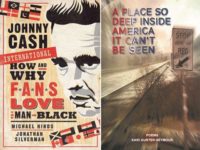 This month’s Book Stand is now up at our website. Visit for new and forthcoming book titles, including five featured books.
This month’s Book Stand is now up at our website. Visit for new and forthcoming book titles, including five featured books.
I’ll Be Here For You: Diary of a Town by Robert McKean is made up of interconnected stories and takes readers to the hardscrabble western Pennsylvania mill town of Ganaego.
In Johnny Cash International: How and Why Fans Love the Man in Black, Michael Hinds and Jonathan Silverman examine Cash’s fan communities and the individuals who comprise them, revealing new insights about music, fandom, and the United States.
Eric Pankey’s Alias: Prose Poems investigates the flexibility and possibility of the prose poem.
Demon Barber by Ruth Bardon explores the grace notes we celebrate in life, and the absences that makes those celebrations ache.
Kari Gunter-Seymour’s A Place So Deep Inside America It Can’t Be Seen explores beyond the boundaries of feminism, science, and spirituality, and renews a sense of understanding and discovery of today’s Appalachian woman.
You can learn more about each of these New & Noteworthy books at our website. Our featured titles can also be found at our our affiliate Bookshop.org. You can find out how to place your book in our New & Noteworthy section here: https://npofficespace.com/classified-advertising/new-title-issue-ad-reservation/.
Spread the word!
Call :: Club Plum Literary Journal Seeks Strong Voices
Deadline: Rolling
Submissions open for flash fiction of no more than 800 words and prose poems. Send powerful yet subtle pieces. Send strong voices. Send dreamy words that don’t gush. Skate on the edge of realities. Club Plum also seeks art: Please send one image only of pen-and-ink line art, watercolor, bold colors, experimental work, collage, impressionistic or abstract pieces. Tell the editor about your piece. The editor will pass on photography. See clubplumliteraryjournal.com for details. Volume 1 Issue 3 features work from William L. Alton, Ron Burch, Barry Jay Kaplan, James McAdams, Scott Ragland, Emelia Steenekemp, Jake Stimmel, Mary Buchinger, Jason Kahler, Natalie Eleanor Patterson, Katie Anderson, Ann-Marie Brown, Clara Choi, Tim Stuemke, and Oormila Vijayakrishnan Prahlad.
Spread the word!
Call :: Palooka Open to Lit Mag & Chapbook Submissions Year-round
Palooka is an international literary magazine. For a decade we’ve featured up-and-coming, established, and brand-new writers, artists, and photographers from all around the world. We’re open to diverse forms and styles and are always seeking unique chapbooks, fiction, poetry, nonfiction, artwork, photography, graphic narratives, and comic strips. Issue 11 featured work by Paul Luikart, Duke Stewart, Nils Blondon, Khalilah Okeke, Tim Chapman, Mark Halpern, Clark Merrefield, Leanne Hoppe, Donald Illich, and Malia Nahinu. Give us your best shot! Submissions open year-round. palookamag.com
Spread the word!
Contest :: 2022 $5,000 Miller Williams Poetry Prize
Deadline: Rolling
Every year, the University of Arkansas Press accepts submissions for the Miller Williams Poetry Series and from the books selected awards the $5,000 Miller Williams Poetry Prize in the following summer. For almost a quarter century the press has made this series the cornerstone of its work as a publisher of some of the country’s best poetry. The series is edited by Patricia Smith. The deadline for the 2022 Prize is September 30, 2020. For more information visit uapress.com. The 2020 prize winner was Jayson Iwen’s Roze & Blud which was released in March 2020.
Spread the word!
Call :: Second Revolution Literary Magazine Issue 2
Deadline: Rolling
We are currently seeking submissions for the second issue of Second Revolution. All forms of written and visual work are accepted, and poetry especially is encouraged; most submissions will be given personalized feedback. We seek to publish vivid work that is emotionally potent and history, socially, or culturally significant. Investigative blog articles are also encouraged. More details about the publication may be found www.secondrevolutionmag.com, and submissions may be emailed to [email protected].
Spread the word!
THEMA – Summer 2020
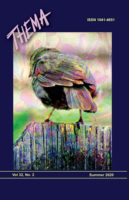
For the Summer 2020 issue of THEMA, writers and artists explore the theme “The Clumsy Gardener.” See how Sarah Gramelspacher, Charlotte Stacey, John Delaney, Madonna Dries Christensen, Virginia McGee Butler, Donna Aycock Meares, and others interpret the theme.
Spread the word!
Call :: The Petigru Review Open to Submissions through July 31
Deadline: July 31, 2020
Don’t forget The Petigru Review is looking for surprising stories, poems, essays, and first novel chapters for their annual online literary journal. They are especially interested in supporting diverse and emerging voices. Submissions close 7/31/20 or when they hit 500 submissions. www.thepetigrureview.com
Spread the word!
Call :: Haunted Waters Press 2020 Reading Periods
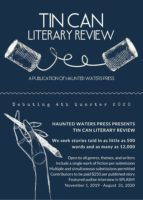 Deadline: August 31, 2020
Deadline: August 31, 2020
Haunted Waters Press now seeking submissions for consideration in Tin Can Literary Review—our debut fiction anthology celebrating the works of new, emerging, and seasoned authors. We seek stories told in as little as 500 words and as many as 12,000. Selected works to be paid $250 per published story. Also seeking works of fiction, poetry, and flash for paid print publication in the 18th issue of From the Depths and in consideration for 2020 HWP Awards. Penny Fiction 2020 will showcase exceptionally short stories told in exactly 20 words—no more, no less. Details: www.hauntedwaterspress.com.
Spread the word!
The Shore – Summer 2020
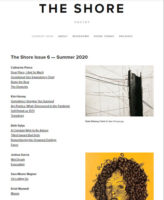
The summer issue of The Shore features dazzling poetry by: Catherine Pierce, Kim Harvey, Beth Gylys, Joshua Garcia, Sara Moore Wagner, Kristi Maxwell, Dillon Thomas Jones, Matthew Bruce, Lorrie Ness, C.C.Russell, Travis Truax, Stanley Princewill McDaniels, Njoku Nonso, Erin Rodoni, Phillip Sterling, William Doreski, and more.
Spread the word!
Call :: Blueline 2020 Reading Period Open
Deadline: November 30, 2020
BLUELINE: A Literary Magazine Dedicated to the Spirit of the Adirondacks seeks poems, stories, and essays about the Adirondacks and regions similar in geography and spirit, focusing on nature’s shaping influence. Submissions window open until November 30. Decisions mid-February. Payment in copies. Simultaneous submissions accepted if identified as such. Please notify if your submission is placed elsewhere. Electronic submissions encouraged, as Word files, to [email protected]. Please identify the genre in the subject line. Further information at bluelineadkmagazine.org.
Spread the word!
Rathalla Review – Spring 2020
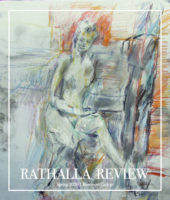
The Rathalla Review Spring 2020 issue features work by Timothy Dodd, Liam Strong, Thad DeVassie, Nathan Spoon, Isaac W Sauer, Henry Stimpson, Jeffery H. MacLachlan, Phillip Sterling, Adam Luebke, and Bina Ruchi Perino.
Spread the word!
Presence – 2020
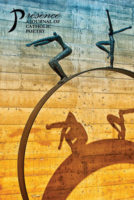
The 2020 issue of Presence features poets Sean Thomas Dougherty and Angela Alaimo O’Donnell. Also in this issue: translated work by María Eugenia Vaz Ferreira, Laura Chalar, Julio Herrera y Reissig, Federico García Lorca, Lucía Estrada, Fina García Marruz, and more; poetry by Ann Applegarth, Collin Becker, Aaron Brown, Ann Cefola, Paola Corso, Susan Cowger, Janet McCann, Stephen Paling, Skip Renker, and others; and interviews with Christian Wiman and Paul Mariani. There is a lot more to discover in this issue, including an “in memoriam” section, book reviews, and a “life’s work” section.
Spread the word!
Contest :: 2020 Barrow Street Book Prize
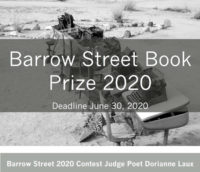 Deadline: June 30, 2020
Deadline: June 30, 2020
Barrow Street is accepting submissions for the 2020 Book Prize Contest. This year’s contest judge is Pulitzer Prize finalist Dorianne Laux. Past winners include 2019 Simone Savannah collection Uses of My Body, chosen by contest judge Jericho Brown; Meg Day for Last Psalm at Sea Level; Page Hill Stazinger for Vestigial; and Ely Shipley for Boy with Flowers. Prize winner receives publication and $1500 cash prize. Online contest fee $28. Submit manuscripts online here: barrowstreet.org/press/submit/.
Spread the word!
The Briar Cliff Review – 2020
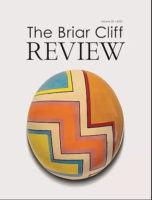
The 2020 issue of The Briar Cliff Review explores themes of violence, disconnectedness, and the legacy of slavery. Find poetry by Jed Myers, Claude Wilkinson, AE Hines, Lindy Obach, Doug Rampseck, Laura Stott, Melanie Krieps Mergen, Mary Fitzpatrick, Dar Hurni, and more; fiction by Deac Etherington, Carrie Callaghan, and others; and nonfiction by Karen Holmberg, Ryan McCarl, and more. Plus, two book reviews and pages of art.
Spread the word!
Call :: Fiction Southeast Wants Articles on Writing
Submissions accepted year-round.
Fiction Southeast seeks articles about writing, interviews, and essays from MFA students as well as emerging and established writers. These can be articles concerning the publication process, writing a synopsis, composing a query letter, dealing with rejection, craft articles, and more. fictionsoutheast.com
Spread the word!
Contest :: Nickie’s Prize for Humor Writing
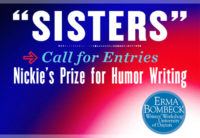 Deadline: Midnight (EST), August 1, 2020
Deadline: Midnight (EST), August 1, 2020
Time to spill the family secrets. Submit your funny sister (or soul sister) story by midnight (EST) Aug. 1, for Nickie’s Prize for Humor Writing sponsored by the University of Dayton’s Erma Bombeck Writers’ Workshop. $300 cash prizes for up to 20 winners. Winning essays will be published online, with the possibility of being included in a future anthology. In the spirit of Erma Bombeck, the tone can be humorous, absurd, offbeat, quirky, or fun in a smart way. All previously unpublished essays no longer than 1,000 words will be considered. Submission fee: $25. Details: humorwriters.org/nickies-prize/.
Spread the word!
Inaugural Nina Riggs Poetry Award Winner
 Rhett Iseman Trull, Editor of Cave Wall poetry magazine has announced the first winner for The Nina Riggs Poetry Award.
Rhett Iseman Trull, Editor of Cave Wall poetry magazine has announced the first winner for The Nina Riggs Poetry Award.
“We were thrilled with the many nominations that came in from individuals, presses, and journals,” Rhett commented. “The 10 finalists that went to the guest judge were powerful poems, all worthy of the award, poems everyone should read.”
Guest Judge Maria Hummel chose Rachel Eliza Griffiths’ poem “Good Mother,” which first appeared in Tin House, as this year’s inaugural winner. Griffiths’ poem can be read here.
The Nina Riggs Poetry Award is a crowd-funded award, with the winner receiving at least $500. “Thanks to the generous donations of so many supporters,” Rhett shared, “we were able to award Rachel Eliza $1,000.”
Honorable Mention went to Melissa Crowe for “Dear Terror, Dear Splendor.”
Finalists
Traci Brimhall, “Oh, Wonder”
Tiana Clark, “A Louder Thing”
Carrie Fountain, “Will You?”
Keetje Kuipers, “Still Life with Small Objects of Perfect Choking Size”
Megan Peak, “What I Don’t Tell My Mother about Ohio”
Thomas Reiter, “Companions”
Anna Ross, “One Time”
Molly Spencer, “A Wooing, Outright, of My Beloved Ones”
Rhett added, “We hope many people will nominate poems for the next round. Any poems received before Nov. 1 will be considered for the 2021 award. We are looking for the finest poems on family, relationships, or domestic life published in the last three years. No self-nominations.”
For more information, visit: http://www.cavewallpress.com/ninaaward.html
Spread the word!
Jessica Hertz Examines Five Fictional Women
In the latest issue of Pembroke Magazine, Jessica Hertz writes of the “Fictional Women I Have Known.” This five-part piece focuses on Alice from Alice in Wonderland, the mermaid from Hans Christian Andersen’s or Disney’s The Little Mermaid, Persephone, the sister from “The Six Swans” fairy tale, and Eve.
Each section explores the complexities of their feelings, their desires, and their realities. They’re not flat women on a page but are thought-out and developed even in the small space provided. I enjoyed Hertz’s take on each of them, and my favorites were the mermaid and Eve. The mermaid is faced with having to choose between a voice or the ability to dance, a choice she wishes she did not have to make. Eve is faced with a choice—eat the offered fruit or don’t—and Hertz asserts she knew exactly what she was doing when she accepted, a take I appreciated.
Peer into the inner thoughts and feelings of these five fictional women with Hertz as your guide.
Spread the word!
Merging Memory with Storytelling
Guest Post by Kate Gaskin
In Wider than the Sky, Nancy Chen Long’s second book of poetry, the biological constraints of memory merge with the practice of storytelling to show how families create intimate legacies and private lexicons that both heal and stifle.
Long uses the language of science to meditate on the power of stories to determine—or even rewrite—reality. In “Interstice,” she writes “Our memory is flooded with holes, pocked like cotton eyelet.” To participate in narrative, then, is to admit its fallibility: “There are gaps in our stories / and in our history. People are missing.” “In the Family of Erasure” shows a daughter and mother engaged in a complicated dance through each other’s individual memories in order to arrive at a shared history they can both tolerate.
Throughout this collection, Long mines both the personal and the general to show how memory is a mutable and ever-evolving force that steers migrating butterflies around long-gone mountains and compels a daughter to clean “off the family’s stains . . . to keep her memory-rooms blameless.” In the closing poem “Wordlust,” Long writes of the bittersweet futility of determining shared history: “The world is filled / with words. We are a seaward-bound people, / chasing a flood / of sorrows our stories cannot explain.” These are tender and insightful poems that probe the fallibility of memory, asking which parts of our legacy we can control and which parts are inherited by complex forces that stretch back into our DNA.
Wider than the Sky by Nancy Chen Long. Diode Editions, March 2020.
Reviewer bio: Kate Gaskin is the author of Forever War (YesYes Books 2020). She is a poetry editor for The Adroit Journal.
Spread the word!
2020 Jeff Marks Memorial Poetry Prize Winner and Finalists
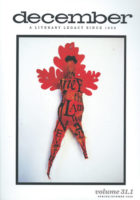 The latest issue of december includes the 2020 Jeff Marks Memorial Poetry Prize winner and finalists.
The latest issue of december includes the 2020 Jeff Marks Memorial Poetry Prize winner and finalists.
First Place
“River” by Kimani Rose
Honorable Mention
“The Mirrored Room” by Carolyn Foster Segal
Finalists
“The Chosen” by Partridge Boswell
“An Invitation to an Eclipse Party” by
“Going to Church” by Gibson Fay-LeBlanc
“Ars Poetica With Clickbait” by Rebecca Foust
“Pink Peonies” by Valentina Gnup
“On Midwest Marriage” by Gina Keplinger
“My Daughter Makes Pan Dulces” by Abby E. Murray
“Origin of a Disaster” by Purnama
“House Bill #118” by Molly Bess Rector
“Rupture” by Raisa Tolchinsky
You can view a selection of these at the magazine’s website, or grab yourself a copy to check out all the placing poems.
Spread the word!
A Time of Hope: Hatchet
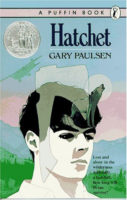 Guest Post by Zizheng William Liu
Guest Post by Zizheng William Liu
Hatchet is the depiction of a world gone wrong. The book details the life of Brian Robeson, the son of divorced parents, and victim of a horrific plane crash. Left alone in the midst of the Canadian wilderness with nothing but a windbreaker and hatchet, Brian must tame himself to survive.
The story begins in the city, where 13-year-old Brian boards a bush plane to see his father for the summer. Miles up into the air, the plane pilot suffer from a heart attack, rendering the plane flying aimlessly above the Canadian landscape. But Brian had always been under tough situations. Ever since he had witnessed the dreaded secret that led to his parent’s divorce, Brian’s life had spiraled out of control. No, literally. The Cessna 406 bush plane that Brian was riding to see his father crashes, and Brian is forced to live his life in the wild. All the luxuries from the city are gone. Food needs to be hunted, shelter needs to be built, and the pesky mosquitoes need to be repelled. Over a month passes since the initial plane crash, and Brian finally finds a solution. He scavenges a transmitter from the plane ruins and that ultimately leads to his rescue. A fur buyer had been alerted to Brian, but the 54 days that Brian spent in the wilderness had still taken its toll.
A thrilling and powerful piece, Hatchet shows that any problem can be solved, even when life is on the line. In a time when the Covid-19 pandemic has swept through our nation, this book is an insight into the true potential that we all have. When utilized, no problem is too big to be solved.
Hatchet by Gary Paulsen. Scholastic Press, 1986.
Reviewer bio: Zizheng William Liu is an avid writer. His works have been published in multiple literary journals and he is an editor for Polyphony Lit Magazines.
Spread the word!
Call :: Change Seven
Deadline: June 30, 2020
Change Seven is an online literary journal. We seek to publish the best available fiction, creative nonfiction, poetry, visual art, book reviews, and more from both established and emerging talents. We most enjoy writing that comes from experience, is well-crafted, lyrical, distinctive, and accessible. Language is important. We like work that takes risks, that is morally unflinching, not for the sake of spectacle but for some daunting and tender rendering of truth. That is not to say we don’t also admire subtlety and quieter pieces of work. We love those, too. Humor as well. Just make it matter. changesevenmag.com
Spread the word!
A Thought-Changing Read
On May 19th, 2020, Hunger Games author Suzanne Collins released the novel The Ballad of Songbirds and Snakes. This dystopian piece is a prequel to Collins’s bestselling series. The Ballad Of Songbirds and Snakes takes place during the tenth annual Hunger Games and centers around young Coriolanus Snow. Snow is chosen to mentor in the Hunger Games and feels mortified when he is assigned the tribute from district twelve, Lucy Gray Baird. In the capital, district citizens were inferiors—less than people. Coriolanus felt disgraced to be assigned a girl from district twelve. However, Snow begins to learn that Lucy Gray isn’t just a girl from district twelve. She’s a very smart young woman who likes to wear rainbow dresses, sing, dance, and make a scene. She begins to become a hit in the capitol and Snow begins to see her in a new light. He begins to believe that she has a shot at winning the Hunger Games.
This story helps Hunger Games fans understand how Katniss and Peeta’s world came to be. The reader is taught the history of the dystopian country, and the hardships Snow and his family faced.
The reader learns how certain events and traditions came to place in the Hunger Games universe. Readers will fall in love with the bold characters in the novel, and will definitely find themselves audibly gasping and laughing along with the story. Collins’s use of striking imagery will make the reader feel as though they are apart of the journey. Collins shocks readers with how much the story can compare to our world and our real-world issues. The story revolves around power, control, and how people will react to it on larger scales. You’d be surprised how children fighting for their lives in an arena would compare to what is happening now. The Ballad of Songbirds and Snakes is a must-read and is the thought-changing tale of the year.
The Ballad of Songbirds and Snakes by Suzanne Collins. Scholastic Press, May 2020.
Reviewer bio: Mia is a fifteen-year-old upcoming high school sophomore who adores creative writing and dystopian literary pieces.
Buy this book from our affiliate Bookshop.org.
Spread the word!
Call :: Xi Draconis Books Seeks Socially Engaged Work through July 31
July 31 is the deadline to submit manuscripts for consideration to Xi Draconis Books. They seek socially engaged, book-length works of fiction, nonfiction, and poetry for its 2020 and 2021 production years. They accept novels, short story and poetry collections, memoirs, essay collections, and cross-genre book-length works. Their mission is to publish works that examine social justice issues of all kinds. Head to xidraconis.org/submission-guidelines/ to submit.
Spread the word!
A Meditation on Friendship
Guest Post by Leah Browning
I Refuse is a novel by Per Petterson about two childhood friends. Tommy and Jim are now adults and have been estranged for many years when they unexpectedly cross paths on a bridge outside Oslo.
Per Petterson, who also grew up in Norway, is a thoughtful and moving writer. Overall, I see this book is a meditation on friendship, not only between the two main characters, but between others as well. There are several instances where a spontaneous act of kindness reverberates through another person’s day or even, in at least one case, an entire lifetime.
The book also focuses on something slipperier: the role of persistence or determination in a person’s life. One of the boys has a harsh, even brutal home life; the other has, in many ways, been luckier. Either could be destroyed by his circumstances.
At the beginning of the book, one of the men has been fishing, but it could have been either one: “As a rule I drove home before the first cars came down the hill towards the bridge, but today I had frittered my time away. I hadn’t even started to pack my bag, and the cars that were coming were classy cars, expensive cars. I turned my back to the road, my frayed navy blue reefer jacket wrapped tightly round me. I’d had that jacket ever since I was a boy in Mørk, and only one of the old brass buttons was still intact, and I had a woollen cap on as blue as the jacket, pulled down over my ears, so from behind I could have been anyone.”
Ambition has pushed one of the men in a strange, sometimes cruel direction. In this time of social distancing, reading about the powerful impact of friends and family members feels especially relevant.
I Refuse by Per Petterson (translated from the Norwegian by Don Bartlett). Graywolf Press, 2015.
Reviewer bio: Leah Browning edits the Apple Valley Review, which publishes short fiction, personal essays, and poetry in spring and fall issues. She occasionally blogs at https://leahbrowning.blogspot.com/.
Buy this book through our affiliate Bookshop.org.
Spread the word!
Event :: Storyville Writing Workshop Offers Online Workshops
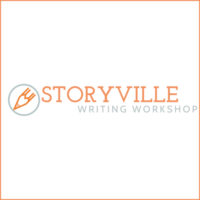 Ongoing Enrollment; Location: Online
Ongoing Enrollment; Location: Online
Storyville Writing Workshop offers virtual writing workshops online for a wide variety of skill levels. Workshops provide personalized critiques, ongoing email access to the instructor, writing resources, personal virtual meetings via Google Meet, as well as access to writing forums. storyvilleworkshop.com/online-workshops/
Spread the word!
If Borges is a Writer’s Writer Then Calveyra is a Writer’s Writer’s Writer
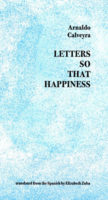 Guest Post by Jason Gordy Walker
Guest Post by Jason Gordy Walker
Reading the prose poems of Calveyra, one feels the guiding presence of an enthusiastic genius, a soft-spoken bard, an artist of nature and deep emotional impression. With his subtle touch, the poet paints miniature landscapes of the mind and the natural world it experiences: “I came looking through loose autumn and slowed to a thistle beside the slide piled high with dead leaves. Wild! recently bloomed and gone into the raw milk.” These poems, all untitled, have a cumulative, epiphanic effect. His common tropes, such as chickens, the wind, the moon, the horizon, and the expanse of the countryside, shimmer with meaningfulness.
Calveyra’s verse pays respect and close attention to the local language of the region he grew up in, Entre Ríos. In translation, the result is occasionally clipped syntax and/or off-beat slices of language thrown into the midst of clear sentences, which leads the reader into a dreamlike state of consciousness: “Oh, the chicken’s already come in clucking with huge umbrella wings and this cheep-cheep will pass will pass and the last one will stay!” He has a talent for switching tones in a single poem. One moment the mood may be ecstatic, the next sorrowful or contemplative, the next whimsical, curious.
Elizabeth Zuba’s breezy translations do the poems justice. Perhaps the best way to absorb the book is to read the Spanish aloud first, refining a taste for Calveyra’s internal rhymes and rhythms. Next, with the originals in mind, read the English translations; the effect is often mesmerizing. During the pandemic, with all of the stress, worry, and panic that comes with it, reading Calveyra prompts one to think, as the poet opens the final piece in his collection, “Please don’t be worried, I’m not.” Calveyra, who fled Perón’s Argentina for Paris in 1961, deserves a wider audience.
Letters So That Happiness by Arnaldo Calveyra. Ugly Duckling Presse, May 2018.
Reviewer bio: Jason Gordy Walker, a student at MFA@FLA, has published poetry in Confrontation, fiction in Monkeybicycle, and criticism in Birmingham Poetry Review and Alabama Writers’ Forum. He is against American Fascism.
Buy this book through our affiliate Bookshop.org.
Spread the word!
Call :: About Place Journal Seeks Submissions through August 1
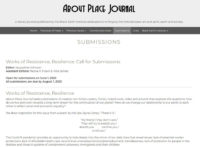 Deadline: August 1, 2020
Deadline: August 1, 2020
Each issue of About Place Journal, the arts publication of the Black Earth Institute, focuses on a specific theme. From 6/1 to 8/1 they’ll be accepting submissions for their Fall 2020 issue Works of Resistance, Resilience. Their mission: to have art address the causes of spirit, earth, and society; to protect the earth; and to build a more just and interconnected world. They publish prose, poetry, visual art, photography, video, and music which fit the current theme. More about this issue’s theme and their submission guidelines: aboutplacejournal.org/submissions/.
Spread the word!
Update Your Submission Calendar – South 85 Journal

Update your calendars—South 85 Journal has announced they’ve changed their reading general reading periods. They’ll now be reading from February 1 to April 16, and August 1 to October 15, though this is subject to change in the future. For now, make note and get your subs ready for August.
Or, if you’ve already been polishing your poetry and flash fiction and are looking for somewhere to submit, submissions for the Julia Peterkin Poetry & Flash Fiction Contests are now open until August 1. Marlin Barton will judge the flash fiction submissions, and Denis Duhamel will judge the poetry.
Spread the word!
Contest :: Final Month to Submit to RATTLE’s 2020 Poetry Prize
July 15th is the deadline to submit to the 15th annual Rattle Poetry Prize which has grown to $15,000 for a single poem. Ten finalists also receive $200 and publication, and are eligible for the $5,000 Readers’ Choice Award. With an entry fee that is simply a one-year subscription to the magazine—and a runner-up Readers’ Choice Award to be chosen by the writers themselves—the Rattle Poetry Prize aims to be one of the most writer-friendly and popular poetry contests around. Visit www.rattle.com/prize for the complete guidelines and to read all of the past winners.

